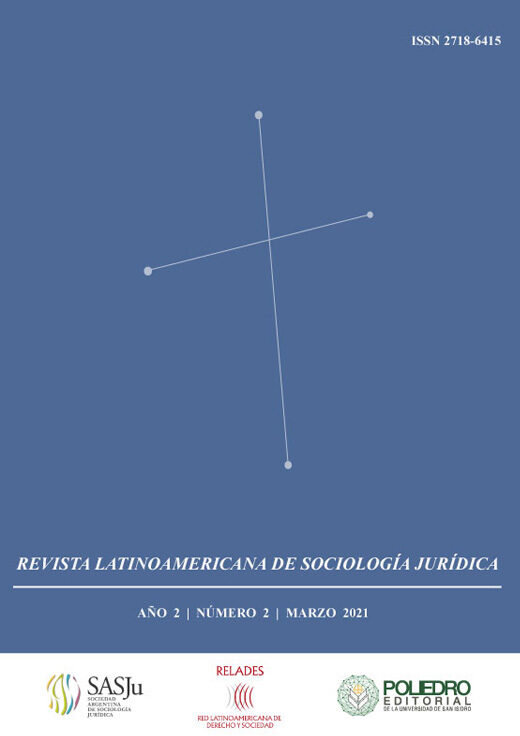PENAL IDEOLOGIES EXEMPT FROM PENAL TREATMENT: AN ANALYSIS OF THE MAIN RETRIBUTIVE AND EXPRESSIVE THEORIES OF PUNISHMENT
Keywords:
theories of punishment, retributionism, positive general prevention, expressive theoriesAbstract
This article makes a critical-descriptive analysis of the main theories of punishment, developed in the last two centuries, that have not had the criminal treatment of people sentenced to imprisonment as relevant. In particular, it analyzes the theories of retribution and general prevention of punishment, with emphasis on the so-called "expressive theories". Through a bibliographic survey we will demonstrate the main characteristics of each one of these theories, being considered more relevant those that had more prominence in the Western penal scenario and the most relevant authors. The so-called "mixed theories" will not be addressed by a methodological option.
Downloads
References
Byrd, B. Sharon. (2010). “Kant´s Theory of Punishment: Deterrence in its Threat, Retribution in its Execution”, in: Acem, Elsa, Byrd, B. Sharon y Hruschka, Joachim (Eds.), Kant’s Doctrine of Right: A Commentary, Cambridge, Cambridge University Press, in: Revue Québécoise de Droit International, Vol. 24-2, 2011, pp. 239-242. Disponível em: . Acesso em: 8 Jan. 2021.
Erber-Schropp, Julia Maria. (2016). Schuld und Strafe: Eine strafrechtsphilosophische Untersuchung des Schuldprinzips, Tübingen, Mohr Siebeck.
Feuerbach, Anselm von. (1847). Lehrbuch Des Gemeinen in Deutschland Gultigen Peinlichen Rechts, Giessen, G.f. Heyer.
Feuerbach, Paul Johann Anselm. (1972). Anti-Hobbes, Ovvero, Il Limiti Del Potere Supremo e Il Diritto Coattivo Dei Cittadini Contro Il Sovrano, traduzione Di m. a. Cattaneo, Milão, Giuffre.
Feuerbach, Paul Johann Anselm. (1989). Tratado de Derecho Penal, traducción al castellano por Eugenio R. Zaffaroni e Irma Hagemeier. Buenos Aires: Hammurabi.
Günther, Klaus. (2014). “Criminal Law, Crime and Punishment as Communication”, in: Simester, Andrew P., Du Bois-Pedain, Antje & Neumann, Ulfrid. (Ed.), Liberal Criminal Theory: Essays for Andreas von Hirsch, Oxford, Hart Publishing Ltd.
Hegel, Georg Wilhelm Friederich. (1986). Princípios Da Filosofia Do Direito, tradução: Orlando Vitorino, Lisboa, Guimarães.
Hegel, Georg Wilhelm Friedrich. (1820). Grundlinien Der Philosophie Des Rechts, Berlim, Verlag von Duncker und Humblot.
Hobbes, Thomas. (1839). “Leviathan, or the Matter, Form, and Power of a Commonwealth Ecclesiastical or Civil (1651)”, in: Molesworth, William (Ed.), The English Works of Thomas Hobbes of Malmesbury, Vol. III, London, John Bohn.
Hörnle, Tatjana. (2006). “Die Rolle Des Opfers in Der Straftheorie Und Im Materiellen Strafrecht”, Juristen Zeitung, No. 19.
Hörnle, Tatjana. (2011). “Gegenwärtige Strafbegründungstheorien : Die herkömmliche deutsche Diskussion”, in: A. von Hirsch, U. Neumann, & K. Seelmann (Eds.), Strafe - Warum? Gegenwärtige Strafbegründungen im Lichte von Hegels Straftheorie (pp. 11–30). Baden-Baden, Nomos.
Hörnle, Tatjana. (2015). “Expressive Straftheorie”, in: HIilgers, Thomas. Koch, Gertrud. Möllers, Christoph. Müller-Mall, Sabine (Ed.), Affekt & Urteil. Paderborn, Wilhelm Fink Verlag.
Jakobs, Günther. (2006). Staatliche Strafe: Bedeutung Und Zweck, Verlag Ferdinand Schöningh, Paderborn, München, Wien, Zürich, 2004, Traducción al español de M. Cancio Meliá y B. Feijoo Sánchez, La Pena Estatal: Significado y Finalidad, Madrid, Thomson Civitas.
Jakobs, Günther. (2008). Norm, Person, Gesellschaft: Vorüberlegungen Zu Einer Rechtsphilosophie, 3 ed., Berlim, Duncker & Humblot Verlag.
Kant, Immanuel. (1798). Metafísica Dos Costumes.
Kant, Immanuel e Paulo Quintela. (1986). Fundamentação Da Metafísica Dos Costumes, Traduzido Do Alemão por Paulo Quintela, Lisboa, Edições.
Merle, Jean-Christophe. (2002). “Uma Alternativa Kantiana para a Prevenção Geral e a Retribuição”, Veritas (Porto Alegre), Vol. 47, No. 2, pp. 237-247. Disponível em:
<https://doi.org/10.15448/1984-6746.2002.2.34872>. Acesso em: 8 Jan. 2021.
Pawlik, Michael. (2004). Person, Subjekt, Bürger: Zur Legitimation von Strafe, Berlim, Duncker & Humblot Verlag.
Ribeiro Giamberardino, André. (2014) “A Construção Social da Censura e a Penologia um Passo Além: Reparação Criativa e Restauração”, Sistema Penal & Violência. Vol. 6, No. 1, pp. 100 e 101.
Rusche, Georg, and Otto Kirchheimer. (2004). Punição e Estrutura Social, 2 ed. Rio de Janeiro, Revan.
Teixeira, Adriano. (2015) Teoria da Aplicação da Pena: Fundamentos de uma Determinação Judicial da Pena Proporcional ao Fato, 1 ed., São Paulo, Marcial Pons.
Zaffaroni, Eugenio Raúl y Alejandro Slokar. (2002). Derecho Penal: Parte General, 2 ed., Buenos Aires, Ediar.


